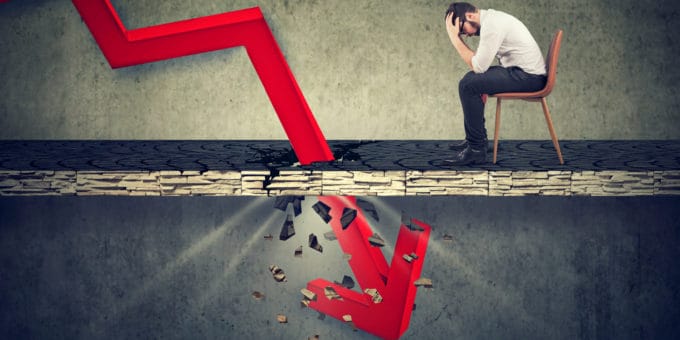A bankrupt person cannot be a limited company director until the court lifts their financial restrictions and discharges them from their debts. This usually happens 12 months after the date of the bankruptcy order, but it can be longer.
If you are an undischarged bankrupt, you are also prohibited from being directly or indirectly involved in the formation or management of a company. However, you can apply to the court for permission to act as a director whilst bankrupt.
The information in this post relates to bankruptcy in England and Wales. There are different rules and processes for bankruptcy in Scotland and bankruptcy in Northern Ireland. If you live in either of these countries, you cannot declare yourself bankrupt in England or Wales.
What is bankruptcy?
Administered by The Insolvency Service, bankruptcy is a type of legal insolvency process that enables individuals to write off unsecured personal debts that they can’t afford to repay in a reasonable amount of time.
When a person is made bankrupt, creditors can’t take any additional legal action against the individual to recover debts. Furthermore, they cannot continue to demand payments, charge interest on outstanding debts, or contact the bankrupt individual.
Bankruptcy has serious implications, so this process should only be used as a last resort. Personal assets, such as your car or home, may be sold. You will also lose any savings and shares, although pensions are usually safe.
Your bankruptcy will remain on your credit file for 6 years. This may affect your ability to keep or find a job, particularly if you work in the financial or legal sector. Bankruptcy can also affect tenancy agreements and make it difficult to take out credit in the future.
Who can be made bankrupt?
Bankruptcy only applies to individuals, including company directors, LLP members, partners in general partnerships, and sole traders.
It does not apply to limited companies or partnerships. Insolvency is the equivalent legal process for companies and partnerships that cannot pay their debts.
How can an individual be made bankrupt?
A bankruptcy order (a formal court order declaring an individual bankrupt) can be made for one of the following three reasons:
- You can’t pay what you owe and want to declare yourself bankrupt
- A creditor applies to make you bankrupt because you owe them at least £5,000
- An insolvency practitioner makes you bankrupt because you have broken the terms of an individual voluntary arrangement (IVA)
You can declare bankruptcy in England or Wales even if you live outside the UK. However, you must have lived in England or Wales in the last three years or had a business there at some point during that time.
Bankruptcy restrictions on limited company directors
Bankruptcy has a significant impact on limited company directors. If you are a director when you are made bankrupt, you will most likely be disqualified (i.e. banned from the role).
Under Section 11 of the Company Director’s Disqualification Act (1986):
It is an offence for a person to act as director of a company or directly or indirectly to take part in or be concerned in the promotion, formation or management of a company, without the leave of the court, at a time when […] the person is an undischarged bankrupt in England and Wales or Scotland or Northern Ireland.
This means that until you are discharged from your bankruptcy order, you may not perform the following functions without the court’s permission:
- be appointed as the director of a limited company
- continue acting as the director of a limited company
- have any involvement in the registration, management, or promotion of a limited company
- be a member of a limited liability partnership (LLP)
- have any involvement in the registration, management, or promotion of an LLP’s business or affairs
- run a business under a different name without disclosing this name and your undischarged bankrupt status to those with whom you do business
- be a trustee of a charity or certain pension schemes
- work in various posts in education (e.g. a school governor)
- work in various posts, or enter into certain contracts, in the health industry
- hold various posts in certain public authorities or similar organisations
Furthermore, you cannot borrow (or attempt to borrow) more than £500 without informing the lender that you’re bankrupt, nor can you work as an insolvency practitioner.
All of these bankruptcy restrictions will remain in place until your bankruptcy ends.
If you are the sole director of a company
If you are the sole director of a limited company and you become bankrupt, you must resign as a director. Upon doing so, your company will need to be dissolved.
Alternatively, if you want to keep your company active during your bankruptcy, you can appoint someone as a director to run it for you. However, you need to do this before you are declared bankrupt—otherwise, the company will be wound up.
Upon appointing a new director, you can continue working for the company as an employee. However, unless you get permission from the court, you must refrain from having any involvement in the management of the business until you are discharged from the bankruptcy order.
This means that you cannot carry out any directors’ duties or influence the new director’s actions or decisions in any way.
Failure to adhere to these restrictions could result in an extension of your bankruptcy order. You could also face criminal charges. We discuss these potential consequences later in the article.
If the company has other directors
If you become bankrupt and the company has other directors, you must notify them immediately and resign as a director. You cannot be reappointed as a director or have any involvement in running the business until your bankruptcy order has ended. However, you may be an employee of the company in the meantime.
Bankruptcy restrictions on company shareholders
If you are also a shareholder, your company shares will pass to the trustee appointed to manage your bankruptcy. Your trustee will either be an official receiver or an insolvency practitioner.
How long does bankruptcy last?
Bankruptcy and imposed restrictions usually end when you are ‘discharged’ from your bankruptcy order. This is normally one year after being made bankrupt. However, it can be longer if you fail to cooperate with your trustee.
Once you have been discharged, you can be a company director. This means that, where applicable, you are free to:
- be reappointed to the company from which you had to resign
- be involved in the management and promotion of a company or LLP
- register a new company or LLP
However, if a Bankruptcy Restrictions Order (BRO) is made against you, the restrictions under the order could remain in place for up to 15 years. This could prevent you from acting as a company director during the allotted time.
Consequences of acting as a company director while bankrupt
Unless you have permission from the court to act as a company director or be involved in a company’s management while bankrupt, you could face serious consequences for breaking the bankruptcy restrictions.
In such situations, you may be:
- guilty of a criminal offence, punishable by up to 2 years in prison and an unlimited fine
- personally liable for any company debts that arise while you’re managing the business
- subject to a Bankruptcy Restriction Order (or an additional one if you already have a BRO against you)
If you ask someone to assist you in breaking the restrictions, they may also be subject to prosecution and liable for certain company debts.
Simply resigning as a director is not enough to prevent such consequences if the undischarged bankrupt continues to influence or actively participate in the company’s management.
How to apply to the court for permission to continue as a director
Under certain circumstances, the court may grant a bankrupt company director permission to continue in their role.
Under section 17 of the Company Directors Disqualification Act 1986, you can apply to the court for permission to act as a director notwithstanding disqualification.
Typically, you will need to satisfy the court that you have a reasonable requirement to act in such a capacity, as opposed to simply wanting to be a director.
You must also satisfy the court that, if permission is given, the public will be adequately protected. The court may require safeguards and impose certain conditions or restrictions. Any income you receive from the role may be subject to an income payments order.
If you are considering making such an application, contact the Insolvency Service at legalservices@insolvency.gov.uk for general information and guidance.
However, you should also consider obtaining independent professional guidance from a legal advisor.
Can a bankrupt director operate as a sole trader instead?
Bankrupt individuals, including those who were company directors, can operate as sole traders. However, certain restrictions will be imposed until the bankruptcy order is discharged.
You must trade under your own name or the name under which you traded when declared bankrupt. This name must be clearly shown on all business paperwork.
Additionally, you cannot obtain credit over £500 without informing the creditor that you are an undischarged bankrupt.
Wrapping up
Bankruptcy can have severe implications for company directors, potentially impacting their ability to continue running their business. However, there may be other solutions available to you.
If you are in this situation or considering making yourself bankrupt, you should seek professional debt advice before making any decisions.
An advisor can explain your options and, if necessary, assist with an application to the court for permission to act as a director while you are bankrupt.
Please note that the information provided in this article is for general informational purposes only and does not constitute legal, tax, or professional advice. While our aim is that the content is accurate and up to date, it should not be relied upon as a substitute for tailored advice from qualified professionals. We strongly recommend that you seek independent legal and tax advice specific to your circumstances before acting on any information contained in this article. We accept no responsibility or liability for any loss or damage that may result from your reliance on the information provided in this article. Use of the information contained in this article is entirely at your own risk.














Join The Discussion
Comments (16)
I was the sole director and sole shareholder of a limited company, the company was insolvent and I couldn’t afford liquidation so invited the creditors to wind up the company and started the process to dissolve the company. The company had no assets but did have liabilities. The creditors objected to the dissolution as expected.
I made myself bankrupt and continued trading as a sole trader (with the bankruptcy trustees permission). My bankruptcy ended a few months ago and the company is still sitting on limbo on companies house (active – proposal to strike off).
I’m actually now in a position where I could clear the company debt. Would I be right in thinking that if I wanted to I could settle the company debt to allow it to dissolve or resume trading? Or is this likely to have legal implications?
Hi David,
Thank you for your enquiry!
Unfortunately we are unable to provide legal advice but we would recommend you speak to a corporate solicitor about your specific circumstances as they will be best placed to advise you.
Kind regards,
The Rapid Formations Team
Hi once discharged from bankrupcy can you become a director straight away or do you need to leave time after your discharge to go back to being a director ?
Thank you for your kind enquiry, Jodie.
In general terms, once a bankrupt has been discharged from bankruptcy, they can become a director straight away. The only exception to this would be if a prohibition was placed on the person as part of a criminal penalty.
We trust this information is of use to you.
Kind regards,
The Rapid Formations Team
If I wanted to go bankrupt and also wanted to wind up my insolvent company should I just go bankrupt, will this also wind my company up at the same time ?
Thank you for you kind question, Simon. The short answer is no – a limited company is its own legal person and therefore what happens to you as an individual (e.g. bankruptcy) is not linked to whether a company becomes insolvent or not. However, if you are the sole shareholder and director of the limited company, you are very likely to become disqualified from being a director by being declared bankrupt, and at this point, Companies House are likely to attempt to close the company down.
We trust this information is of use to you.
Regards,
The Rapid Formations Team
Hi I was made a limited company director 2 years ago
I’m not given any information about yearly accounts or involved in any decisions made within the companies is this right
Or am I being set up
Thank you for your kind enquiry, Richard.
We are sorry to hear of your situation. Directors have a number of legal duties and responsibilities that are placed upon you, and it is extremely important that you are in a position to be able to fulfil these.As part of that, directors also have a number rights in addition to their responsibilities. For example, they have the right to access company financial records, as well as to participate in any meetings that are held. If you feel are being prevented from doing so, we suggest you seek legal advice.
We trust this information is of use to you.
Kind regards,
The Rapid Formations Team
Hello,
I was made personal bankrupt in 2018 whilst I was the sole director and shareholder of my own company, the insolvency agent told me I had to resign as director which I did immediately, the trustee (insolvency agent) didn’t take control of my shares and now the company is still running and I am being hassled for the companies debts, VAT and accounts although I have no control over them.
Thank you for your kind enquiry, David.
With regards to the shares, in general terms a shareholder who is not a director is only responsible for the debt of a company up to the value of the shares that they own. The only instance this may not happen is if a court finds that the shareholder and/or director has been malfeasant or reckless. It is the directors’ responsibilities to ensure the company is run properly, including the filing of VAT and annual accounts payments. In the first instance we would recommend whoever took over as sole director in your place when you were disqualified from being a director due to bankruptcy, as this is their responsibility.
I trust this information is of use to you.
Regards,
Rachel
Hi, I was in an IVA 9 years ago, fully discharged. In now being offered the chance to sit on the board of a limited company. will that be a problem for me?
The articles of association claim that if you are bankrupt or in composition with creditors then you can’t serve as a Director? I presume that means if that is the case currently?
Any advice much appreciated.
Thank you for your kind response, Natalie.
In general terms, most director disqualifications due to bankruptcy or other financial issues do not last as long as 9 years. However, in certain circumstances they do; but you would have been made aware of the exact term of the disqualification at the time.
It should be noted that entering into an IVA is not the same as bankruptcy, and therefore it may be that you have never been disqualified to be a director.
From the circumstances you have described, you are not bankrupt and you are not in composition with creditors – therefore the articles of association in this instance do not apply to you.
If you are in any doubt as to whether you are presently disqualified to serve as a director or not, you can check your name against the public register of disqualified directors, which can be found here: https://www.gov.uk/search-the-register-of-disqualified-company-directors
I trust this information is of use to you.
Regards,
Rachel
Hi Rachel, that is v helpful, thank you. One thing I wanted to ask is – what does it mean when you say you cannot “promote” a company? Does that mean you can’t sell its wares in any way? Thanks!
Thank you for your kind enquiry, Mark.
Whilst the meaning of the word ‘promotion’ in the context remains open to interpretation, our understanding is that in general terms, promotion includes both the selling of products/services or the marketing of products or services for that company.
I hope this information is of use to you.
Regards,
Rachel
Can you be a company secretary if made bankrupt by your creditors?
Thank you for your kind enquiry, Mary.
In general terms, a person that is an undischarged bankrupt would be unable to serve as a company secretary of a limited company.
I trust this information is of use to you.
Kind regards,
Rachel
Regards,
Rachel